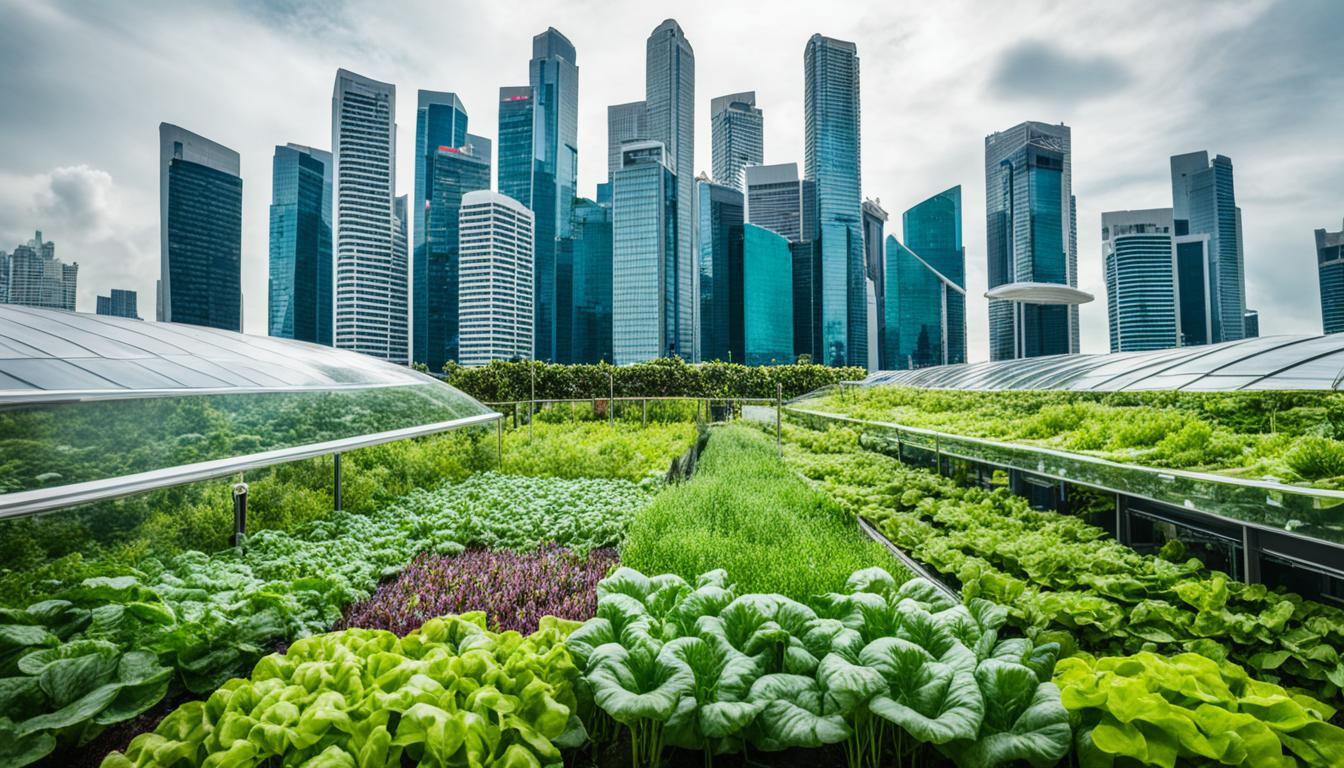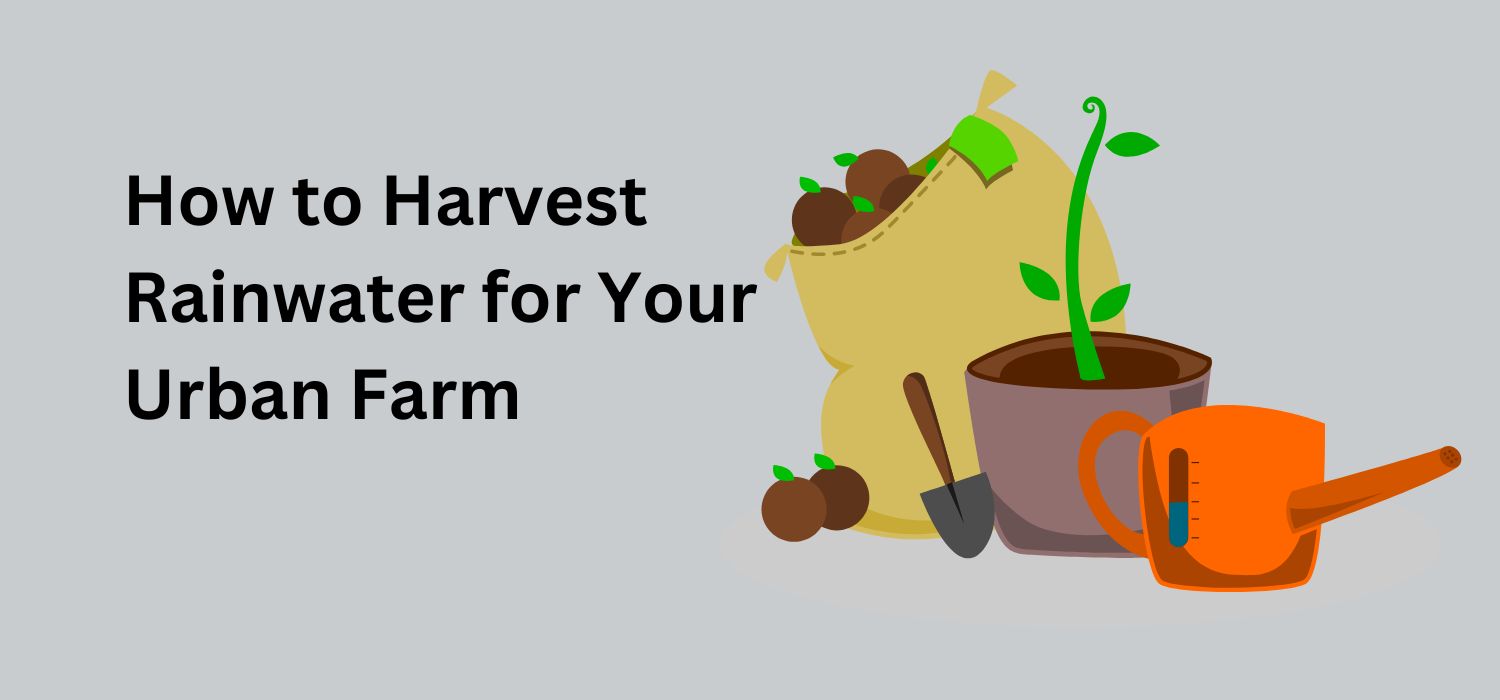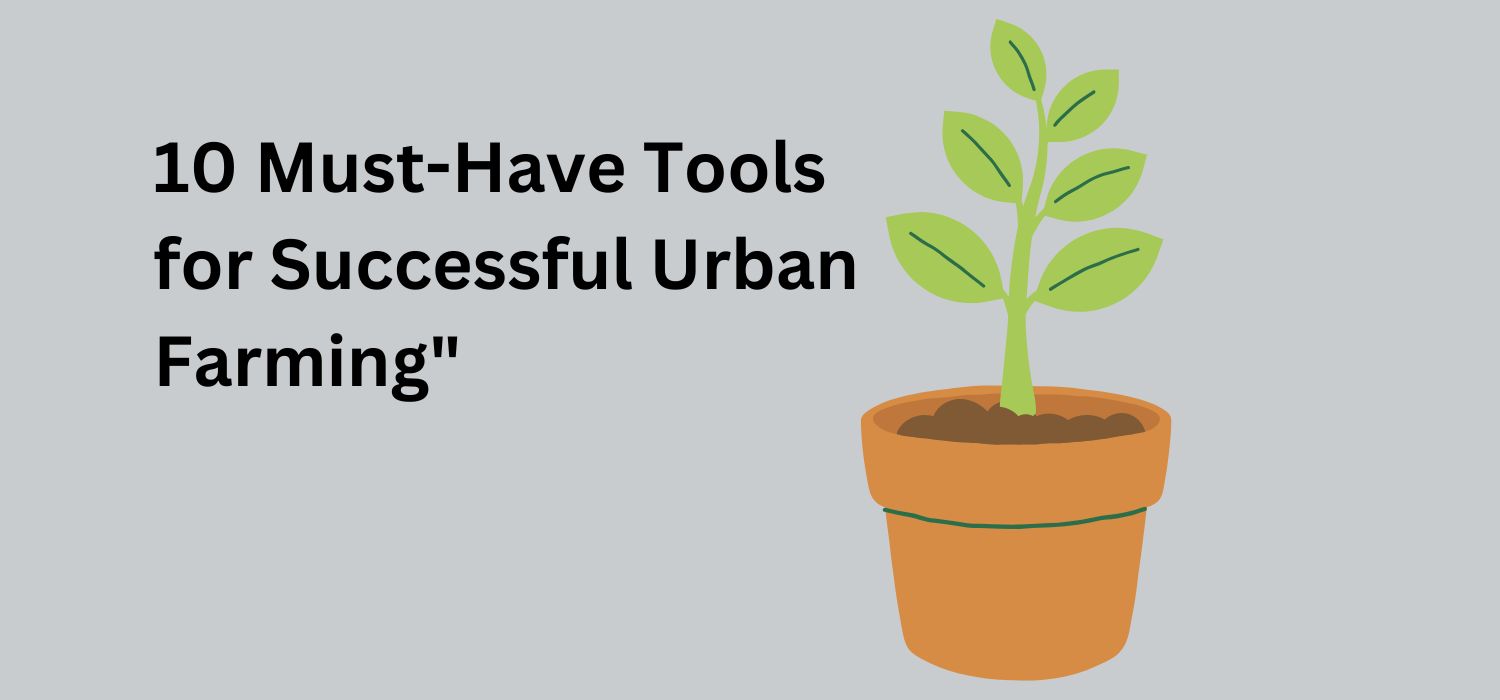Singapore is a bustling city-state with big challenges in sustainable food production. But, urban farming is changing the game for a better food system. This guide will show you why it’s key for Singapore’s future and its many benefits.
Urban farming tackles land issues and boosts local food systems. It’s a big step towards food security in Singapore. With new farming methods like vertical and hydroponic systems, it also helps the environment, economy, and communities. Let’s dive into how urban farming is changing Singapore for the better.
Understanding the Concept of Urban Farming
Urban farming, also known as urban agriculture, is about growing, processing, and distributing food in cities or nearby areas. It brings farming closer to people, cutting down the distance between food sources and consumers.
What is Urban Farming?
Urban farming uses many techniques to make the most of small city spaces. It includes vertical farming, hydroponic systems, community gardens, and rooftop farms. These methods help grow fruits, vegetables, herbs, and sometimes small livestock.
Types of Urban Farming Practices
- Vertical Farming: This method stacks crops in layers, often in special buildings or old structures. It makes the most of limited space.
- Hydroponic Systems: Hydroponics grows plants in nutrient-rich water instead of soil. It uses less land and water than traditional farming.
- Community Gardens: These gardens let city folks work together to grow food. They build community and support local food production.
- Rooftop Farming: Rooftops are used for farming in the city. This method uses special techniques and structures to grow food in the city’s heart.
Cities worldwide are adopting these urban farming methods. They aim to improve local food security, cut down on carbon emissions, and build sustainable food systems.
Singapore’s Unique Challenges and Need for Urban Farming
Singapore is a densely populated city-state facing big challenges. It has limited land and relies on food imports. This makes urban farming key for food security.
Limited Land Resources
Singapore is small and growing fast, putting pressure on its food production. With over 5.6 million people in just 278 square miles, it’s very crowded. This makes traditional farming hard, highlighting the need for urban farming.
Dependence on Food Imports
Singapore imports over 90% of its food, making it vulnerable to global supply chain issues. Urban farming can help reduce this dependence and boost local food production.
| Metric | Singapore | United States |
|---|---|---|
| Land Area (sq mi) | 278 | 3,796,742 |
| Population (millions) | 5.6 | 329.5 |
| Population Density (per sq mi) | 20,106 | 87 |
| Food Self-Sufficiency Rate | 10% | 86% |
Singapore’s challenges, like limited land and high food imports, highlight the need for urban farming. By using new farming methods and promoting local production, Singapore can improve its food security. This will make it less dependent on global supplies and create a more sustainable food system for its people.
Environmental Benefits of Urban Farming
Urban farming is great for the environment. It cuts down on the distance food travels, reducing carbon emissions. This makes it a key part of a sustainable food system.
Urban farming uses new methods like vertical farming and hydroponics. These methods make the most of limited space, reducing the strain on the environment. They help produce food efficiently in cities, making our cities more sustainable.
Reducing Carbon Footprint
Urban farming is good for the planet because it lowers the carbon emissions from food production and transport. Growing food locally means less travel for the food. This helps fight climate change by reducing emissions from the global food chain.
“Urban farming has the potential to revolutionize the way we approach food production and distribution, ultimately contributing to a more sustainable and environmentally-conscious future.”
Urban farming also uses renewable energy and closed-loop systems. These methods save natural resources, reduce waste, and support a circular economy. They make our food system greener and more sustainable for the future.
Economic Advantages of Urban Agriculture
Urban farming in Singapore brings big economic wins. It helps create jobs, supports small farmers, and cuts down on imported food costs. This makes Singapore stronger and more self-sufficient.
It also sparks new industries and tech, boosting the economy. With more people wanting sustainable food, things like vertical farming could become big money-makers. This draws in investors and encourages new businesses.
| Economic Benefit | Description |
|---|---|
| Job Creation | Urban farming can create employment opportunities in areas such as production, distribution, and marketing of locally-grown produce. |
| Support for Small Producers | Urban farming initiatives can help small-scale local farmers and entrepreneurs access new markets and distribution channels, improving their economic viability. |
| Reduced Reliance on Imports | By increasing the availability of locally-sourced food, urban farming can reduce Singapore’s dependence on imported goods, which are vulnerable to price fluctuations and supply chain disruptions. |
| New Industry Development | The growth of urban farming can stimulate the development of innovative technologies, products, and services, creating new business opportunities and economic growth. |
Urban farming in Singapore does more than just grow food. It creates jobs, helps small businesses, and makes Singapore stronger. It also leads to new industries and tech. As Singapore focuses on sustainable food systems, urban farming will be key to its future success.
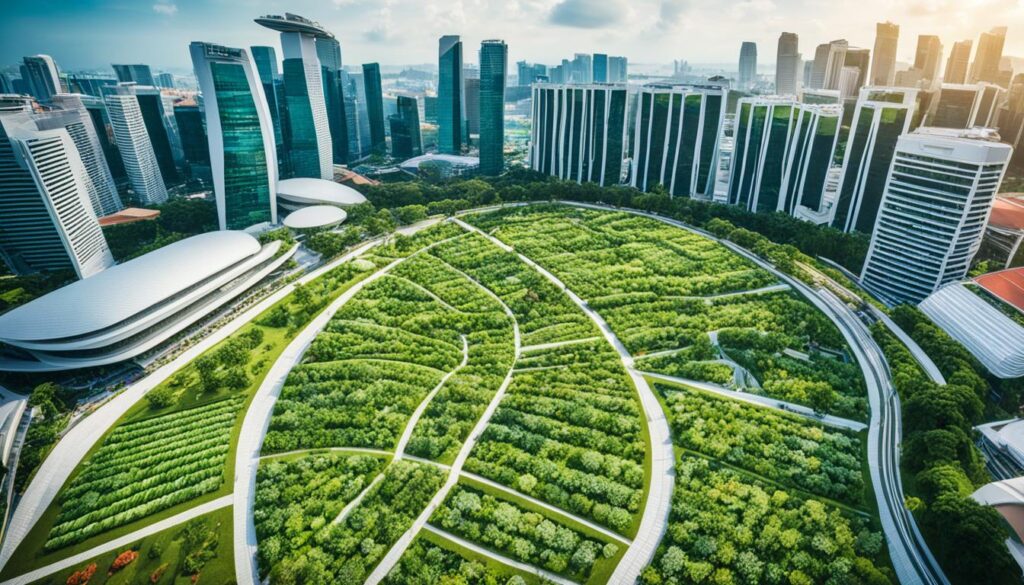
Enhancing Food Security and Self-Sufficiency
Urban farming is key to making Singapore more food secure and self-sufficient. It boosts local food production. This helps the city-state deal with global supply chain issues. It makes sure Singapore has enough food, especially when things get tough.
Addressing Food Supply Chain Disruptions
Today, supply chain problems can affect food availability and prices worldwide. Urban farming helps by making food production local. This way, Singapore can handle supply chain issues better, keeping food safe for its people.
| Metric | Before Urban Farming Initiatives | After Urban Farming Initiatives |
|---|---|---|
| Food Self-Sufficiency Rate | 10% | 30% |
| Reliance on Imported Food | 90% | 70% |
| Resilience to Supply Chain Disruptions | Low | High |
The table shows how urban farming has improved Singapore’s food security and self-sufficiency. It has cut down on imported food and made the food supply more reliable. This makes sure Singapore’s people have enough to eat.
“Urban farming is not just about growing food; it’s about building a more resilient and self-sufficient food system that can withstand the challenges of our time.”
Community Building and Social Impacts
Urban farming in Singapore can bring people closer together. These projects become places where folks meet, share tips, and feel like they belong. By joining in, different groups can meet, learn about green living, and help their neighborhoods grow.
Fostering Connections and Inclusivity
Community gardens and farms are more than places to grow food. They’re where people meet, learn, and bond. Everyone can help out, making these spaces a place for all to feel welcome. This helps people from various backgrounds come together, learn, and value sustainable farming.
| Benefits of Urban Farming for Community Building | Impacts on Social Inclusivity |
|---|---|
|
|
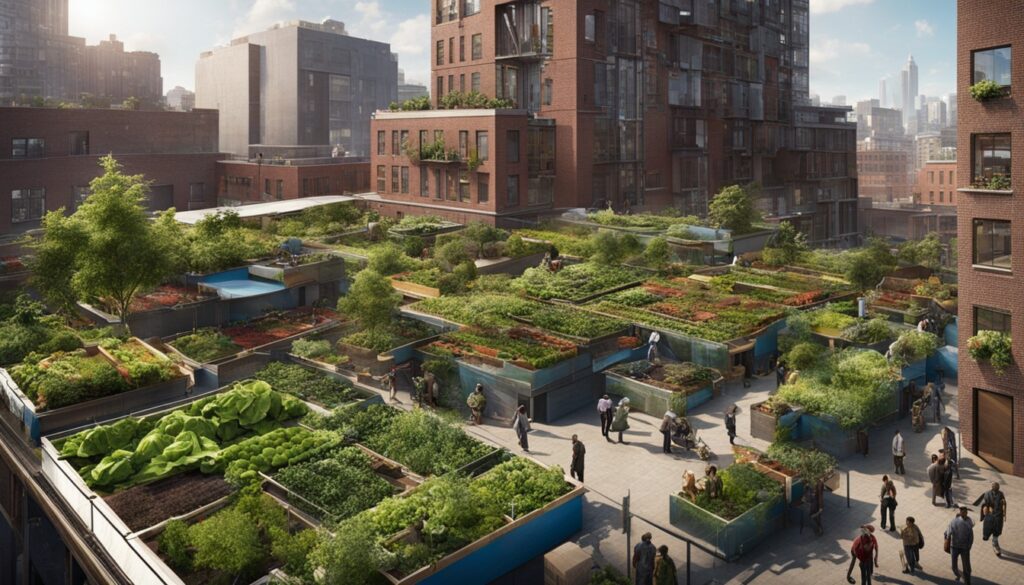
“Urban farming initiatives in Singapore have the power to transform not just our food systems, but the very fabric of our communities. By coming together to cultivate the land, we not only nourish our bodies, but also our connections with one another.”
Embracing Sustainable Food Production Methods
Singapore faces challenges with limited land and a growing population. Innovative farming methods like hydroponic systems and vertical farming are gaining ground. These methods are key to solving food security and environmental issues.
Hydroponic Systems: Efficient and Space-Saving
Hydroponic systems grow plants without soil, changing urban farming in Singapore. They control nutrients and water precisely, making farming more efficient. These systems use vertical space well, fitting Singapore’s limited land.
Vertical Farming: Maximizing Yields in Tight Spaces
Vertical farming takes food production up a notch. It stacks crops on top of each other, making the most of small spaces. With LED lighting and automated watering, these farms grow a variety of crops in controlled conditions.
Using hydroponic and vertical farming in Singapore is a big step towards sustainable food. These methods help with land use and cut down on environmental harm. They’re key to a greener, more self-sufficient food system.
“Sustainable food production methods, such as hydroponic systems and vertical farming, are crucial for Singapore’s food security and environmental sustainability.”
Why is Urban Farming Important in Singapore?
In Singapore, where land is scarce, urban farming is key for food security, sustainability, and community building. With a growing population and limited land, urban farming is essential for the city’s future.
Urban farming is crucial in Singapore because it helps produce more local food. By growing crops and raising animals in the city, Singapore can use fewer food imports. This makes the country more self-sufficient and less vulnerable to supply chain problems.
Urban farming is also vital for sustainability. It uses eco-friendly methods, like renewable energy and closed-loop systems. This reduces its environmental impact and supports Singapore’s goal of a sustainable future.
Lastly, urban farming in Singapore builds community. It brings people together for gardening, sharing skills, and a closer connection to nature. This strengthens social bonds and community spirit in the city.
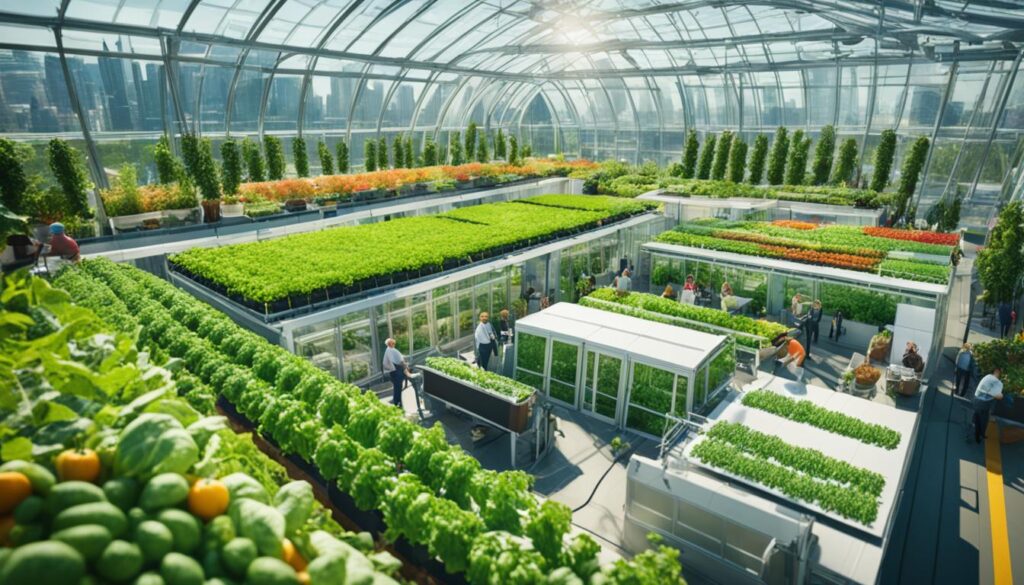
The value of urban farming in Singapore is clear. It tackles many challenges, from ensuring food security to promoting sustainability and building community. Urban agriculture is a key part of Singapore’s future.
Promoting Urban Greenery and Biodiversity
Urban farming in Singapore does more than grow food. It boosts urban greenery and biodiversity. By adding green spaces and diverse plants, these farms and gardens clean the air, help local wildlife, and make cities prettier and more livable.
Urban farming increases urban greenery by growing fruits, veggies, and plants. This makes cities look better and helps fight the urban heat island effect. It also cuts down air pollution and improves air quality.
Urban farming supports biodiversity too. It offers food and shelter for many insects, birds, and small animals. This creates ecosystems that help balance the city’s nature, which is key for sustainability.
By blending urban greenery and promoting biodiversity, urban farming is crucial for a better, sustainable city. It uses nature to improve life for people and the environment.
“Urban farming is not just about growing food; it’s about creating a more vibrant, sustainable, and livable city for all.”
Overcoming Challenges in Urban Farming
Urban farming has many benefits but also faces challenges, especially in a crowded city like Singapore. One big challenge is finding enough space. This has led to new ideas like vertical farming and hydroponic systems.
Addressing Space Constraints
In Singapore, farmers are finding new ways to use land wisely. Vertical farming stacks crops in layers to grow more food on less land. Hydroponics uses water full of nutrients instead of soil. This helps use space better and cuts down on the need for big farms.
Developing Innovative Solutions
Urban farmers in Singapore are also trying new things to make the most of limited space. They use rooftops, old shipping containers, and even underground spaces for farming. These methods help produce more food in the city.
| Innovative Solution | Benefits |
|---|---|
| Vertical Farming | Increased yield per square foot, efficient use of space |
| Hydroponic Systems | Reduced land requirements, enhanced water and nutrient efficiency |
| Rooftop Gardens | Utilization of underutilized urban spaces, improved local food production |
| Repurposed Shipping Containers | Compact and mobile farming units, adaptable to urban environments |
| Underground Farms | Innovative use of subterranean spaces, potential for year-round production |
Singapore is a leader in urban farming, thanks to its creative farmers and researchers. They’re finding new ways to use every bit of city space. This makes the most of every corner for farming.
Government Initiatives and Policies
The Singapore government sees urban farming as key to solving food security and promoting sustainable growth. It has launched initiatives and policies to boost innovation, encourage the private sector, and support urban farming. These efforts aim to make urban farming successful.
The Singapore Food Agency’s (SFA) “30 by 30” program is a major push. It aims to increase food production to meet 30% of Singapore’s nutritional needs by 2030. To achieve this, the government is investing in urban farming tech, research, and infrastructure. The SFA offers funding, technical help, and support for urban farming businesses to grow.
Along with the “30 by 30” program, Singapore has introduced policies and incentives to promote urban farming. These include:
- Tax incentives for companies investing in urban farming projects
- Funding schemes for developing new urban farming technologies
- Streamlined processes for starting urban farming operations
- Collaborations with research institutions and universities for urban farming R&D
The government is also working to transform underutilized urban spaces into farming areas. This includes creating rooftop farms, vertical farming facilities, and community gardens. These projects give residents easy access to fresh, local produce.
Through these government initiatives and policies, Singapore is leading the way in urban farming. The country’s success in improving food security, sustainability, and community engagement is inspiring others worldwide.
Urban Farming as a Lifestyle Choice
In Singapore, urban farming is more than a way to grow food and protect the environment. It’s becoming a lifestyle for many. People are finding joy in growing their own food and connecting with nature.
Community gardens and urban farms are places where people learn and have fun. They offer a break from the city life. Here, people can relax, meet others, and share their love for sustainable living.
Reconnecting with Nature
Urban farming teaches us to live more mindfully and care for the earth. By growing their own food, people learn about nature’s cycles and the value of healthy soil. This close connection to nature improves their well-being and changes their life view.
- Cultivating a personal garden or joining a community farm helps people feel closer to nature.
- Urban farming teaches us about sustainable food and caring for the environment.
- Being part of urban agriculture can boost mental health by reducing stress and giving a sense of pride.
As urban farming grows in Singapore, more people see it as a way to improve their lives. It helps them feel connected to their community and supports a sustainable future.
“Urban farming has transformed the way I view my city. It’s not just a place to live, but a living, breathing ecosystem that I can actively participate in and nurture.” – Jane Doe, urban farmer
Conclusion
Urban farming is key to Singapore’s future. It boosts food security, supports the environment, and brings people together. This approach is vital for a resilient and livable city.
Urban farming helps Singapore use its land better and reduce food imports. It makes sure the country has enough food for its people. Plus, it’s good for the planet by cutting down on carbon emissions and protecting nature.
Urban farming also builds stronger communities. It connects people with nature and each other. This helps create a more united and eco-friendly society in Singapore.
